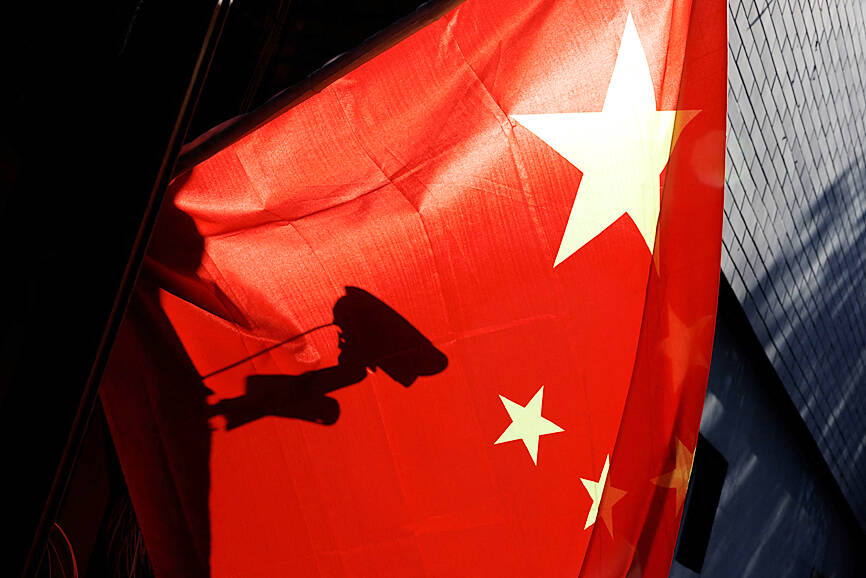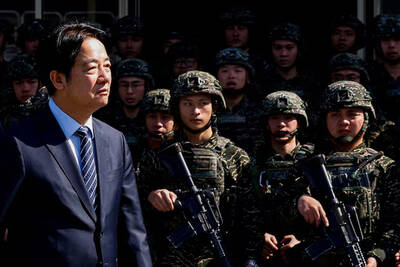The Democratic Progressive Party (DPP) yesterday said it would propose amendments to echo President William Lai’s (賴清德) call for a “disclosure mechanism” for Taiwanese officials to travel to China.
Lai on Thursday called for a “disclosure mechanism” to ensure central and local government officials remain transparent and accountable to the public when visiting China for exchanges.
“From government officials to elected representatives, from legislators to village and borough wardens, all should make exchange information public and transparent to be accountable,” Lai said at a news conference at the Presidential Office.

Photo: Reuters
Calling China a “foreign adversary” in his speech, Lai added that the “disclosure mechanism” for organizations is intended to prevent Beijing’s “interference and united front efforts.”
DPP caucus chief executive Rosalia Wu (吳思瑤) yesterday said party legislators are working with government officials, including at national security agencies, to enact the 17 proposals Lai made at Thursday’s national security meeting.
The caucus has drafted bills for some of the proposals and held discussions for others, she said.
The legislature must consider national security to be the top priority for every session in the face of China’s increasingly dangerous and sophisticated strategies to infiltrate Taiwanese society, she said.
The proposed changes would require lawmakers and elected representatives at the special municipality and county-level councils to obtain approval before traveling to China, she said.
Mainland Affairs Council Minister Chiu Chui-cheng (邱垂正) on Friday said the council urged Taiwanese to report to the government before traveling to China to protect their safety.
Meanwhile, a Ministry of the Interior official yesterday said benign, orderly and equitable exchanges with China are permitted for non-profit organizations and religious groups.
Religious groups are allowed to visit China, but must request approval from the Taiwanese government to sign any agreement, they said.
People involved in these exchanges should be vigilant about guarding their personal information against government-directed espionage or exploitation by fraudulent groups, they said.
Taiwanese planning to travel to China could voluntarily report to the Ministry of the Interior’s online platform “dynamic registry system for citizens traveling in China” (赴陸動態登錄系統), they said.
The record would allow the government to provide legal or other forms of assistance in case of an emergency that endangers the Taiwanese traveler, the official said.
Additional reporting by Lee Wen-hsin, Fang Wei-li and CNA

The Taipei Mass Rapid Transit (MRT) Wanda-Zhonghe Line is 81.7 percent complete, with public opening targeted for the end of 2027, New Taipei City Mayor Hou You-yi (侯友宜) said today. Surrounding roads are to be open to the public by the end of next year, Hou said during an inspection of construction progress. The 9.5km line, featuring nine underground stations and one depot, is expected to connect Chiang Kai-shek Memorial Hall Station to Chukuang Station in New Taipei City’s Jhonghe District (中和). All 18 tunnels for the line are complete, while the main structures of the stations and depot are mostly finished, he

The first global hotel Keys Selection by the Michelin Guide includes four hotels in Taiwan, Michelin announced yesterday. All four received the “Michelin One Key,” indicating guests are to experience a “very special stay” at any of the locations as the establishments are “a true gem with personality. Service always goes the extra mile, and the hotel provides much more than others in its price range.” Of the four hotels, three are located in Taipei and one in Taichung. In Taipei, the One Key accolades were awarded to the Capella Taipei, Kimpton Da An Taipei and Mandarin Oriental Taipei. Capella Taipei was described by

Minister of Economic Affairs Kung Ming-hsin (龔明鑫) yesterday said that private-sector refiners are willing to stop buying Russian naphtha should the EU ask them to, after a group of non-governmental organizations, including the Centre for Research on Energy and Clean Air (CREA), criticized the nation’s continued business with the country. While Taiwan joined the US and its Western allies in putting broad sanctions on Russia after it invaded Ukraine in 2022, it did not explicitly ban imports of naphtha, a major hard-currency earner for Russia. While state-owned firms stopped importing Russian oil in 2023, there is no restriction on private companies to

President William Lai (賴清德) is expected to announce a new advanced “all-domain” air defense system to better defend against China when he gives his keynote national day speech today, four sources familiar with the matter said. Taiwan is ramping up defense spending and modernizing its armed forces, but faces a China that has a far larger military and is adding its own advanced new weapons such as stealth fighter jets, aircraft carriers and a huge array of missiles. Lai is expected to announce the air defense system dubbed “Taiwan Dome” in his speech this morning, one of the sources said. The system